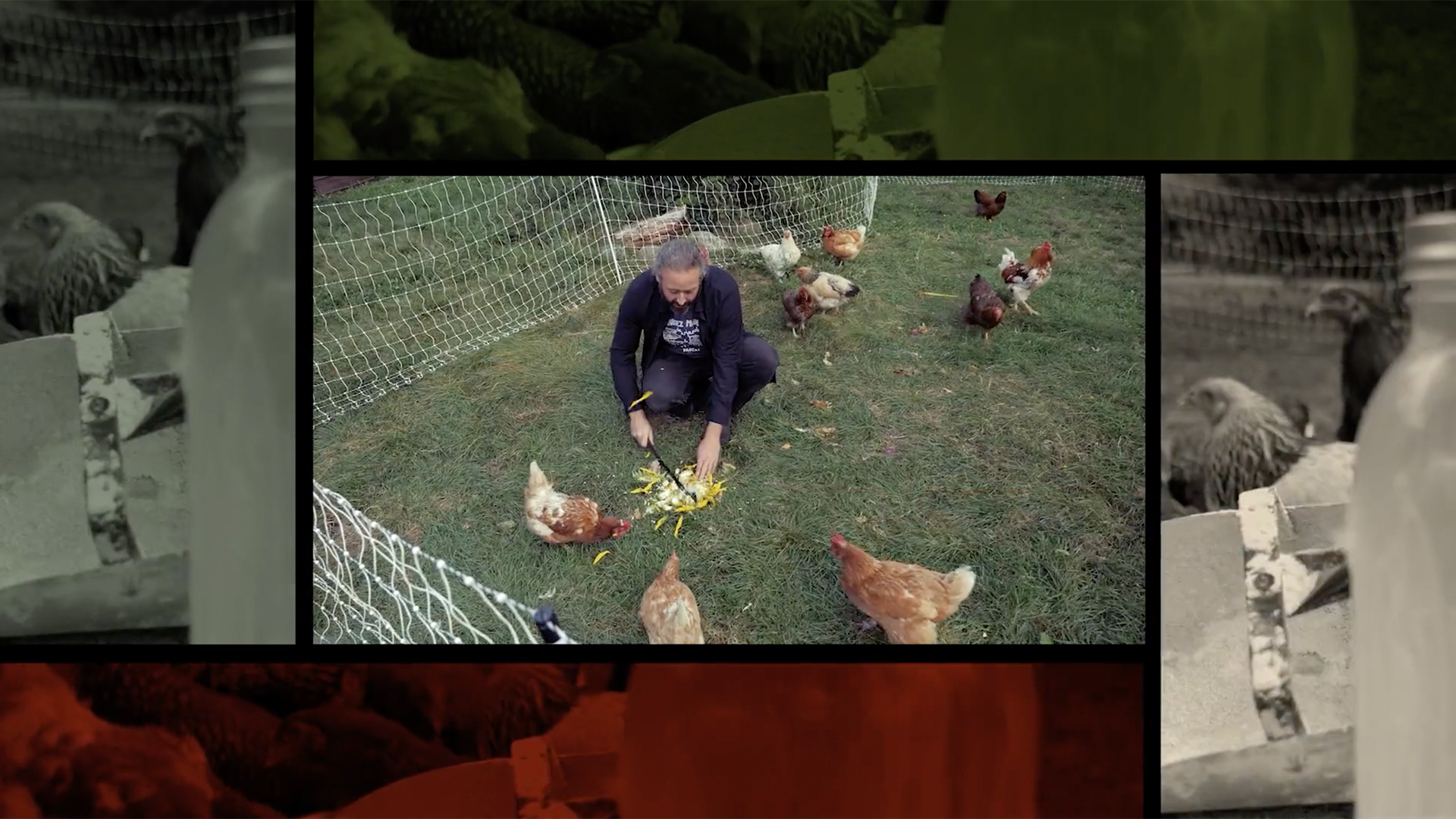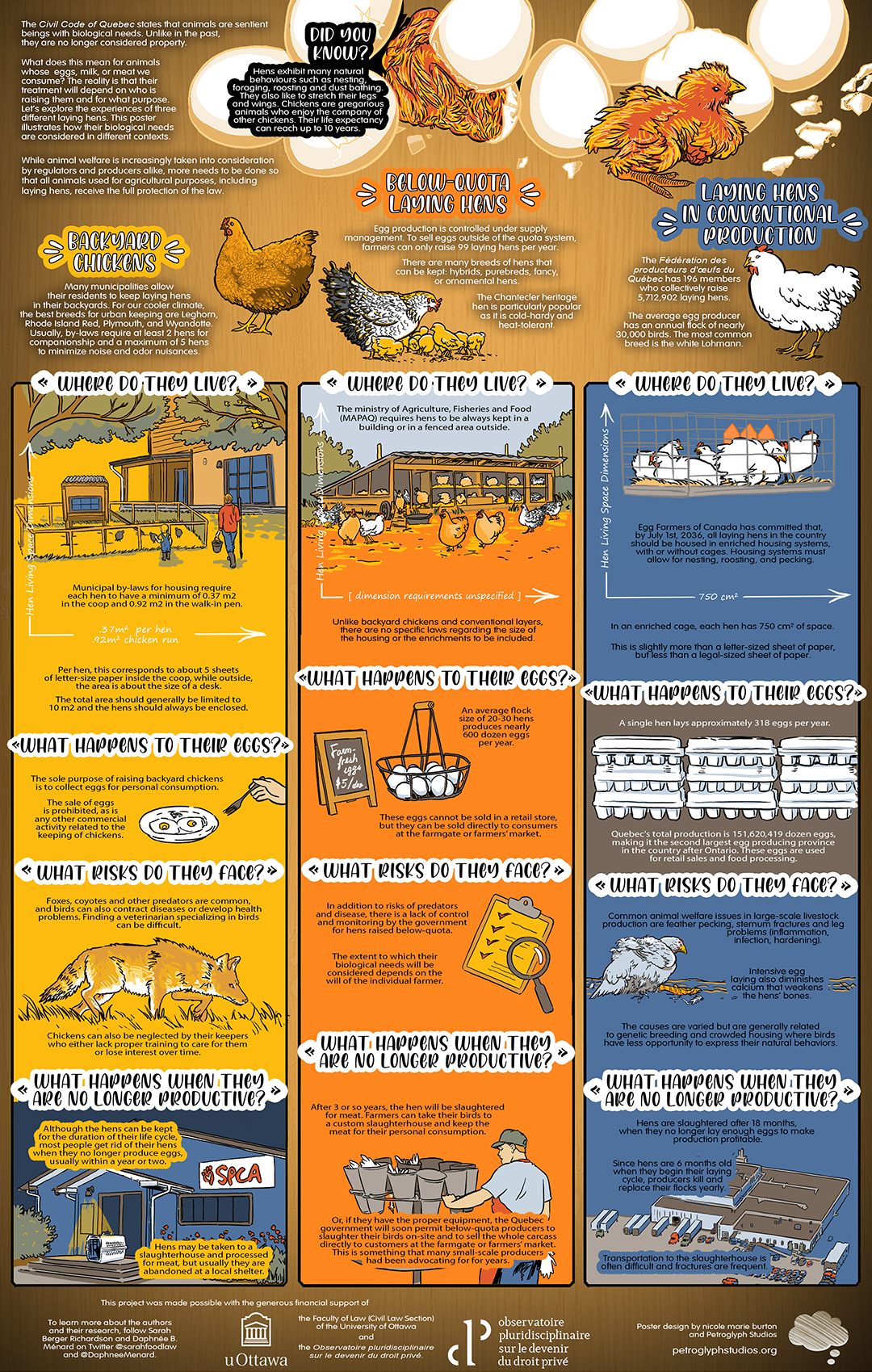At the crossroads of the legal and ethical worlds lies an increasingly pressing question: do some animals have more legal privileges than others? While our pets seem to be born under the aegis of a “privilege of birth”, enjoying rights and protections as human companions, others, such as farm animals, are not so fortunate. The legal status of animals in Quebec, according to which all animals are sentient beings with biological imperatives, makes no such distinction between companion animals and farm animals. Professor Sarah Berger Richardson and doctoral student Daphnée B. Ménard take you on a journey to the heart of this ethical and legal debate. Using the example of the laying hen, they explore the nuances of this complex dynamic and its impact on the reality of the animals that feed us.
The current legal status of animals in Quebec highlights the glaring disparities between companion animals, which are almost considered members of the family, and other animals, including farm animals, which are assigned more utilitarian roles. Animal welfare is an essential element of a sustainable food chain, and consequently the animal must be at the heart of the reflection on the reform of our agri-food systems.
The new legal status of animals in Quebec
Let’s reflect on the impact of the reform adopted in Quebec in 2015 on animal welfare. Does it enable better treatment, increased protection and improved conditions for farm animals? Doctoral student Daphnée B. Ménard invites you to take a closer look at the impact of this reform on the lives of laying hens in three different contexts: city hens, over-quota laying hens and laying hens in conventional production.
Self-regulation of agricultural production
How can different legal systems apply to the same animal? Is the concept of self-regulation within the agricultural industry – where animal care standards are determined by the industry itself rather than government legislation – a way forward? Doctoral student Daphnée B. Ménard highlights the advantages and disadvantages of this duality of systems.
Laying hens in the city
Urban agriculture and the keeping of laying hens in cities are gaining in popularity. As a result, many Canadian and Quebec cities have recently passed by-laws to regulate the keeping of laying hens. For some, this would be an interesting alternative to large-scale egg production, not least because this method – definitely in keeping with the locavore movement – would offer better living conditions for the hens and could reduce food insecurity. However, other voices are warning municipalities and citizens that raising laying hens in the city may not be as easy or as bucolic as one might imagine. The main concerns raised relate to the spread of diseases (including avian flu) and zoonoses, difficult access to specialized veterinary care, the increasing abandonment of hens and roosters in animal shelters, and municipal problems linked to odors, noise and the potentially increased presence of predators such as coyotes.
Animal transport regulations
Would you leave your pet locked in a vehicle in extreme temperatures? Yet farm animals face similar conditions during transport to slaughter. The Canadian Food Inspection Agency (CFIA) regulates animal transportation under the Health of Animals Act and the Health of Animals Regulations. Recent amendments in 2019 have improved animal transport conditions, notably by extending rest periods and taking into account certain characteristics specific to various farm animals. How does Canada compare in terms of animal transport and welfare regulations with Europe and the United States? Professor Berger Richardson discusses this in the context of layer hen farming in Quebec.
On-farm chicken slaughterhouse pilot project

Since 2020, Quebec has been studying the possibility of creating an on-farm slaughter exemption for over-quota poultry. On April 1, 2022, the Projet pilote relatif à l’exploitation d’un abattoir de poulets à la ferme (pilot project for the operation of an on-farm chicken slaughterhouse) was enacted, with the aim of evaluating on-farm chicken slaughtering practices and defining, where appropriate, standards that would allow the operation of an on-farm chicken slaughterhouse. This pilot project was prompted by urgent requests from small-scale producers such as Dominic Lamontagne, whose criticisms of Quebec’s agricultural laws and regulations were the subject of the JuriDoc “Le droit à la ferme”.
If the pilot project proves successful, the on-farm slaughter exception will allow a limited number of producers to slaughter a small number of birds (300 maximum per year) in a controlled environment and sell the whole carcass directly to customers, either on the farm or at the public market. This project applies more to broiler chicken, but there’s no indication that it doesn’t cover laying hens.
A poster to help you understand the regulations applicable to hens
This poster illustrates how hens’ biological imperatives are taken into account in different contexts (available in French only).



